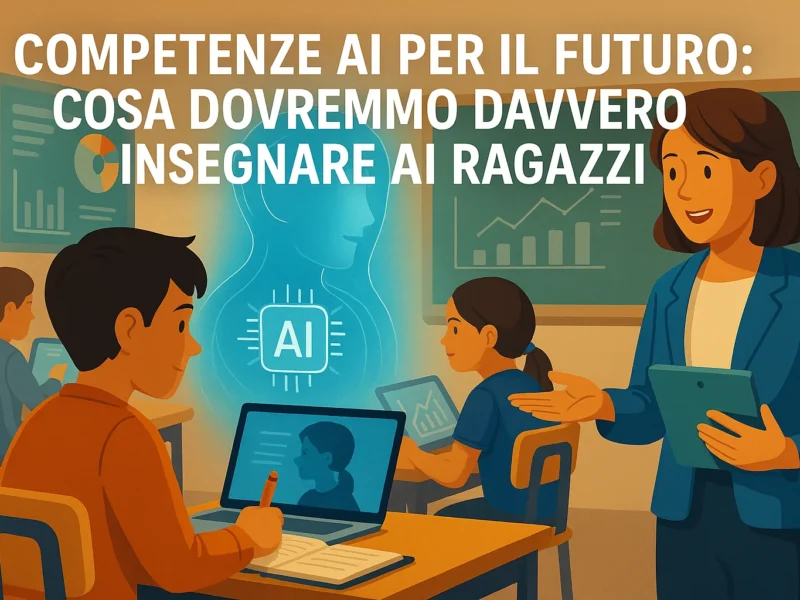The question on everyone (parents and teachers) begin
In a world where artificial intelligence writes the lyrics, produces images, and take autonomous decisions, what we need to teach our kids? You just need to learn to use a tablet? Or we need new forms of literacy, the more deep and conscious? This question is not just about schools, it affects all of us. And the answer is not simple, but it is urgent.
What is a competence and why it really counts
When we talk about skills TO, we are not referring only to the ability to use a tool such as ChatGPT or Midjourney. Let's talk about to understand the operation, the limits, the ethical and social implications artificial intelligence (ai).
Expertise means knowing how to:
– interact with intelligent systems in a critical way,and
– to evaluate the reliability of a response generated by an algorithm,
– understand how they are collected and processed the data,
– collaborate with the AI without being passively driven.
It is a form of literacy, cognitive, and digital that prepares us not only to the work of the future, but active citizenship in a society that is increasingly algorithmic.
Because they serve at the school (and not only in the courses of computer science)
Artificial intelligence is now part of everyday life: from the selection of videos on YouTube to the speech recognition on phones, up to the automatic correction of the tasks disappeared. Don't talk about it at school is the equivalent of leaving the boys alone in a phenomenon that fashions them every daybut they often do not truly understand.
According to UNESCO, the digital skills advanced – including those related to the AI – should be an integral part of the school curricula. Not to turn everyone into programmers, but to ensure a understanding critical and inclusive technology.
We also told in the article Student and tutor IA interact in the educational environment that is inclusive, where the AI becomes an ally of personalised learning, not a substitute.
What to teach (and what to avoid)
No need to teach you to use every new tool that comes out. What counts is develop the mindset, analytical skills, mental flexibility, and ethical awareness. Some examples:
– Thinking computational: even without the code, to understand the logic behind the decisions algorithmic.
– Education to the data: where they came from, how you collect, because they are precious and even dangerous.
– The ethics of technology: understand the risks of bias, surveillance and misinformation generated.
– Increased creativity: to be able to use AI to enhance the imagination, not to replace it.
It is essential that the artificial intelligence is being used with awareness in the classroom, as we detail in Ethics of Artificial Intelligence: why it concerns us all, which stresses the importance of an approach to human-centric.
Examples and initiatives already in progress
In Finland, the online course The Elements of THE it has become part of the program-the national education, with the aim of a project to teach literacy of the population to the responsible use of AI.
In Italy, some schools are experimenting paths with tools like Teachable Machine or Scratch AI, an extension of the famous environment of visual programming.
Also theOECD stresses that the artificial intelligence has become an a cross-cutting themeaddressed not only in computer science but also in civic education, humanities, mathematics.
👉 OECD – AI and the Future of Skills
And according to the The World Economic Forumamong the 10 key skills for 2030 include: solving complex problems, critical thinking and technological literacy.
👉 The WEF Future of Jobs Report
Frequently asked questions (FAQ)
Kids need to learn programming?
Not all of them. But everyone should understand how does an algorithmwhat it means to “training a model” and what are the limits of automated responses.
The school is a threat?
Only if it is misused. If, instead, it is integrated with awareness and guided by trained teachers, can enhance learning and to help each student to grow according to their times.
The skills TO apply outside of school?
Yes, absolutely. Even those who will not make a technical work you will be confronted every day with THE work, in public service, in the media. Be prepared, it is a form of freedom.
Conclusion: a new literacy for the twenty-first century
Artificial intelligence is no longer a theme for experts. It is part of the present, and will be even more part of the future. For this we need to help young people to develop deep expertise, cross-cutting and critical. Not to pursue the technology, but for ride it, to understand it and to live it in a human way.
The future of education is digital only. Is conscious, ethical, and creative. And begin today, in every classroom.
